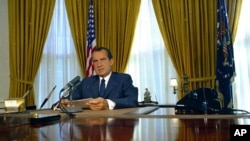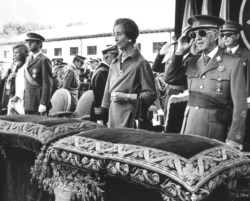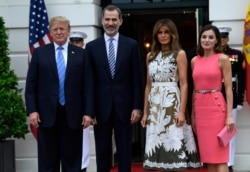The familiar, gruff voice speaks from the past.
President Richard Nixon is heard on tape discussing with a series of top advisers about how to ensure Spain did not lurch into anarchy after the death of General Francisco Franco.
Recordings originally made by Nixon while he was in the White House show how the U.S. president unsuccessfully tried to persuade the longtime Spanish ruler to pass the reigns of power onto a stable successor before he died.
The year was 1971 and General Franco was suffering from Parkinson's Disease but he stayed in power until his death in 1975.
The tapes, which were stored by the Nixon Presidential Library and recently published in Spain by the newspaper El País, offer a fascinating insight into how the U.S. president at the time tried to shape Spanish history, and the kingdom’s relations with Washington – at least in the short term.
Analysts said Washington was far more interested in ensuring access to U.S. military bases in Spain than ushering in a new era of democracy.
When the then-Prince Juan Carlos visited the White House in 1971, Nixon advised the future head of state to make law and order his priority when General Franco died.
Nixon said Juan Carlos should play on his youth and personal charisma to convince Spaniards that things would change once he was king, according to State Department notes of the exchange.
In its transition to democracy after Franco’s death, Spain did experience turbulence that included a dramatic but failed coup in 1981, but never descended into the chaos that Nixon had dreaded.
A troubled friendship?
Nearly fifty years later, with President Donald Trump in the White House, relations between Washington and Madrid have come into difficult waters, some analysts say.
Washington is concerned about Spain's left-wing coalition government, whose junior partner is the far-left Unidas Podemos, or UP, party. Senior members of UP worked as advisers to the Venezuelan government.
Tariffs imposed by Washington on Spanish products, notably olive oil, have rankled Madrid.
Spain's failure to meet U.S. demands for European countries to raise contributions to NATO have also annoyed Washington.
Spain passed a bill to introduce a so-called Google tax on social media giants in June, which would levy higher taxes on these mainly U.S. companies. Mr. Trump has promised reprisals if European states follow through.
"I think the relationship is going through a particularly turbulent moment,” said Dr. Charles Powell, author of The American Friend, about U.S.-Spanish relations and director of the Real Instituto Elcano, a Madrid think tank.
He said the relationship has changed subtly because Madrid is standing up to Washington in disagreements over tariffs imposed by the U.S. on Spanish products and demands from Trump that Spain and other NATO countries spend 2% of GDP on defense. In the end, Spain only spent 0.9%.
“What Spain is trying to do is diluting possible conflicts. Spain is doing this by dealing with the bilateral through the multilateral. This is the novelty.”
Dr. Powell said Spain, by far the weaker country, dealt with military, trade or economic conflicts through NATO, the European Union or the OECD.
Who wins the U.S. presidential election will be of concern in Madrid as elsewhere, he added.
“Obviously this government (in Madrid) would feel better if Mr. Trump was not re-elected. But the U.S.-China rivalry will have to be dealt with whoever is in the White House. So a Biden presidency does not mean it will mean going back to the good old days.”
A poll conducted by the Pew Research Center on behalf of the Real Instituto Elcano found that among 14 European states, Spain was the most opposed to Mr. Trump's key policies.
Respondents were asked about four key Trump policies, migration, withdrawal from the Paris climate deal, withdrawal from the nuclear deal with Iran and raising tariffs. In each case, Spaniards showed the highest level of opposition to U.S. policy.
Strong ties
Juan Tovar Ruiz, a doctor of international relations at the University of Burgos, believes the relations between the two nations are healthy despite disagreements on trade and defense.
“Sure, there have been differences over tariffs, the NATO contributions and the Google tax but what you have to look at is the overall picture and I think the relationship is pretty secure,” he told VOA.
The United States to this day maintains two military bases in Spain and Washington has praised Madrid’s cooperation in efforts to ban Chinese state-owned enterprise Huawei to ban 5G technology from its networks.
“The world’s leading telecom operators – including Spain’s Telefonica, as well as Orange, O2, Jio, Bell Canada, Telus, and Rogers, and many more – are becoming “Clean Telcos.” Disconnecting from the Chinese Communist Party infrastructure. They are rejecting doing business with tools of the CCP surveillance state, companies like Huawei,” Pompeo told reporters in June.
Officially, the Spanish government wanted to avoid highlighting rows.
A source within the Spanish foreign ministry said political squabbles aside, what was more important was the strong economic ties between the U.S. and Spain. “For us, the U.S. is the most important destination of exports outside the EU,” the source, who did not want to be named, told VOA.
The volume of Spanish exports to the U.S. has grown 131% in the past decade, while the number of Spanish companies working there has risen from 10,000 to 31,000.
Officials at the U.S. Embassy in Madrid declined to comment for this article.
VOA's Nike Ching contributed to this story from Washington.









